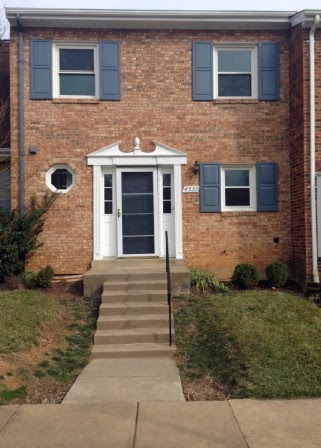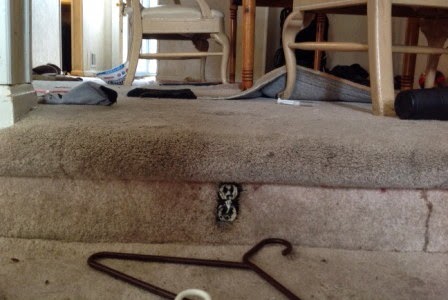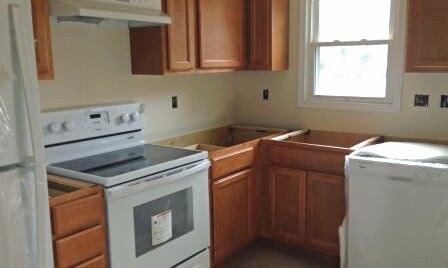Habitat for Humanity renovates bug-infested house for first-time homeowner

Habitat for Humanity of Northern Virginia
has turned a roach-infested, heavily damaged townhouse in Annandale
into a beautifully redone home for a lower-income first-time
homebuyer.
The four-bedroom house at 4537 Garbo Court, in the Cavalcade community off Ravensworth Road, was donated to Habitat in winter 2014 by Mary Ann Elliott.
Rev. Jon Smoot, the executive director of Habitat for Humanity of
Northern Virginia, describes Elliott as “an extremely generous person of
means” who had heard about “a struggling homeless single mother with
four children who had just secured work and was moving out of
homelessness.”
“Out of the generosity of her heart, Mary Ann
contacted the family a couple of years ago and bought the townhouse for
them,” Smoot says. All the woman had to do was keep up with the utility
bills and homeowner association fees. Once she got on her feet
financially, she would be expected to pay rent.
“The generous impulse was well intentioned, but it didn’t work out,” Smoot says. The woman had a difficult time keeping up with the utilities, and what’s worse, she totally trashed the house. “The relationship soured,” and eventually, Elliott had her evicted.
 |
| Before the renovation. [Photos by Habitat for Humanity of Northern Virginia] |
“There were hygiene issues that led to a cockroach infestation,” Smoot says. “There was severe water damage. The kids were unattended and got to do what they wanted. There were holes in the wall. The roaches spread to nearby homes, and the neighbors started complaining.
When Elliott got the property back, she contacted Habitat for Humanity and agreed to donate it if Habitat volunteers could fix it up and sell it to a worthy low-income family.
When Smoot arranged to meet Elliott at property, “she warned us what we would see,” he recalls. “There was no way to describe what the interior looked like. It was alive with multiple generations of cockroaches. The carpet looked like it was moving. The refrigerator was spilling forth with roaches. They were crawling on the walls.”
 |
| The kitchen was completely redone. |
Habitat paid for a professional exterminator, who said it was the third worst infestation he had seen in 20 years in the business. It took three major treatments to knock out the cockroaches.
Renovations started last summer and are just about finished. “We stripped it down to the bare bones,” Smoot says. There is a new HVAC system, some new plumbing, and all new flooring, walls, and carpeting.
“It’s now a gorgeous, new home,” he says. “We’re very excited that a worthy low-income buyer will be able to buy a lovely home near schools, shopping, and transit.”
Once the final inspection is completed, within the next week or two, Habitat will begin advertising the home and select a family that meets the organization’s criteria. The buyer must have a household income that is 80 percent or less than the area median income, have a job, be a first-time homebuyer, have good credit, and pass an employer check and a background check.
“The Habitat model is hand up, not hand out,” Smoot says. Traditionally, Habitat works with a crew of volunteers – with the homeowner putting in sweat equity – to build a home. Because there isn’t a lot of vacant land in Northern Virginia, many of its projects around here are renovations, not new construction.
The house at Garbo Court will be listed at $350,000. Habitat will leverage its relationship with a local bank to ensure the homeowner will have a lower down payment and lower monthly payments than the average buyer – so the total housing costs won’t exceed 32 percent of the buyer’s income.
The buyer will be responsible for securing financing and will be encouraged to take advantage of low-interest mortgage programs through the Virginia Housing and Development Authority or Federal Housing Administration.
Much of Habitat’s funding for this and other projects is from its ReStore home improvement re-sale shops in Alexandria (869 S. Pickett St.) and Chantilly (4311 Walney Road). Habitat has nine homes in production throughout the region; this is the only one in the Mason District.
It’s very rare for the organization to receive a donated house, Smoot says.
“We think it would be great if people or relatives have a piece of property they don’t know what to do with and want to donate it and get a tax break,” he says. “We’d be really happy to take it off their hands and turn it into a great house for a worthy family.”


I wonder where Ms. Mary Ann Elliot lives, hmm? Probably far from the cockroach infested mess that she foisted upon her "neighbors".
If you read the article carefully, you will see that the bug problem was caused by the original recipient of Elliot's donation, whom Elliot evicted. The house is now in very good shape and will likely stay that way. Ms. Elliot did not "unload" trashy property, nor did she simply repair the basic damage; rather, she left it in far better condition at her own expense.
I'll remember not to give you anything for Christmas; you're obviously an ungrateful person.
Anon (5:52) – I agree with you
Thank you for this story, Ellie. It is very inspiring.
Children being unattended and roaming all hours doing what they want seems to be a common Annandale townhouse feature.
Can they do the same for Seven Corners and Bailey's Crossroads?
Too bad the first tenant had no idea how to take care of either the home or the children. I'm at a loss to how someone can receive such a generous gift then trash the place beyond recognition. With luck, Habitat's sweat equity requirement and screening will find a worthy tenant who will be able to lift up her family and be a good neighbor.